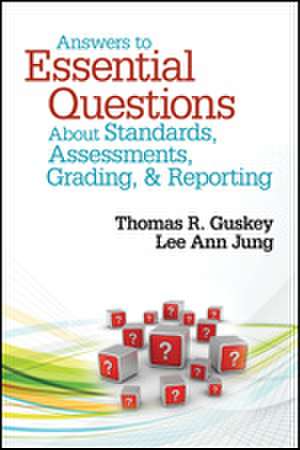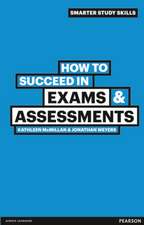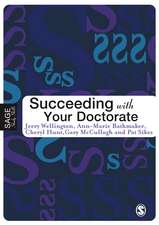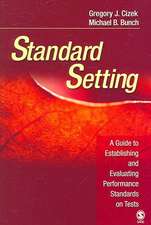Answers to Essential Questions About Standards, Assessments, Grading, and Reporting
Autor Thomas R. Guskey, Lee Ann Jungen Limba Engleză Paperback – 15 ian 2013
Preț: 191.47 lei
Nou
Puncte Express: 287
Preț estimativ în valută:
36.64€ • 38.25$ • 30.32£
36.64€ • 38.25$ • 30.32£
Carte disponibilă
Livrare economică 14-28 martie
Livrare express 28 februarie-06 martie pentru 21.32 lei
Preluare comenzi: 021 569.72.76
Specificații
ISBN-13: 9781452235240
ISBN-10: 1452235244
Pagini: 176
Ilustrații: Illustrations
Dimensiuni: 152 x 229 x 10 mm
Greutate: 0.3 kg
Ediția:1
Editura: SAGE Publications
Colecția Corwin
Locul publicării:Thousand Oaks, United States
ISBN-10: 1452235244
Pagini: 176
Ilustrații: Illustrations
Dimensiuni: 152 x 229 x 10 mm
Greutate: 0.3 kg
Ediția:1
Editura: SAGE Publications
Colecția Corwin
Locul publicării:Thousand Oaks, United States
Recenzii
“Guskey and Jung have waded into the murky waters of standards, assessments, grading and reporting to emerge with a very accessible, readable text, providing thoughtful, research-based answers to the questions most often asked. Whether read in its entirety or utilized as a chapter-by-chapter resource, individuals and groups from all facets of the educational community will find value in its pages.”
“This book was an excellent introduction to assessments for the practitioner, pre-service educators and the lay person. Written in small sections, it explains well how we assess, why we use different assessments, and asks guiding questions for application of assessments. I highly recommend this book for anyone interested in educational assessments.”
“This text is a useful tool that educators can use to build common definitions about frequently used and misunderstood educational terms within their state, district, or school. Only when educators have the same understanding of 'formative assessment' or 'grade reporting' can they be implemented with fidelity.”
"A strong, knowledge based book that hopefully will be well used to guide educational change in the areas of standards, assessment, grading and reporting by all the stakeholders in education."
"This book is a must read for educators and policy makers at all levels. The authors do an excellent job answering essential questions on standards, assessments, grading, and reporting using research-based evidence. If educators follow the authors’ suggestions, learning and teaching in schools would be transformed."
“This book was an excellent introduction to assessments for the practitioner, pre-service educators and the lay person. Written in small sections, it explains well how we assess, why we use different assessments, and asks guiding questions for application of assessments. I highly recommend this book for anyone interested in educational assessments.”
“This text is a useful tool that educators can use to build common definitions about frequently used and misunderstood educational terms within their state, district, or school. Only when educators have the same understanding of 'formative assessment' or 'grade reporting' can they be implemented with fidelity.”
"A strong, knowledge based book that hopefully will be well used to guide educational change in the areas of standards, assessment, grading and reporting by all the stakeholders in education."
"This book is a must read for educators and policy makers at all levels. The authors do an excellent job answering essential questions on standards, assessments, grading, and reporting using research-based evidence. If educators follow the authors’ suggestions, learning and teaching in schools would be transformed."
Cuprins
Acknowledgments
About the Authors
Preface: The Nature of Essential Questions
Part I: Standards
1. What are Standards?
2. Are Standards a New Idea in Education?
3. Why Do Some People Oppose Standards?
Part II: Assessments
4. What Is Assessment?
5. What Is the Difference Between Assessments and Tests?
6. What Is Formative Assessment?
7. Why Are Formative Assessments Important?
8. What Are Common Formative Assessments?
9. What Is Summative Assessment?
10. What Is High-Stakes Assessment?
11. What Are Instructionally Sensitive and Instructionally Insensitive Assessments?
12. How Do Assessments for Learning Differ From Assessments of Learning?
13. Do Formative Assessments Improve Student Learning?
Part III: Grading
14. What Are Grades?
15. What Is the Purpose of Grading?
16. Are Grades Essential to Teaching and Learning?
17. Why Are the First Grades Assigned So Important?
18. Do Low Grades Prompt Students to Try Harder?
19. Why Is Setting Percentage Cut-Offs for Grades an Arbitrary Process?
20. What Is Wrong With Grading on the Curve?
Part IV: Reporting
21. What Criteria Do Teachers Use in Assigning Grades?
22. What Is Standards-Based Grading and Reporting?
23. Why Do Some Parents Have Concerns About Standards-Based Grading and Reporting?
24. If Schools Implement Standards-Based Grading, Will the Grades Assigned to Students Likely Go Up or Down?
25. What Is the Most Important First Step in Implementing Standards-Based Grading?
26. What Is the Best Way to Inform Parents About Moving to Standards-Based Grading?
27. What Is the Best Way to Encourage Parents to Make Comments on the Report Card?
28. Will Standards-Based Grading Improve Student Learning?
Part V: Grading and Reporting for Exceptional and Struggling Learners
29. Who are Exceptional and Struggling Learners?
30. How Do We Assign Grades to Exceptional and Struggling Learners Who Require Modifications?
31. What Is the Difference Between Accommodations and Modifications?
32. How Do We Legally Report Grades for Exceptional and Struggling Learners on Report Cards and Transcripts?
33. Do High School Students Requiring Modifications Receive Course Credit Toward a Diploma? Do Modifications Make a Student Ineligible for Extracurricular Activities, Such as Interscholastic Athletics?
Summary and Conclusions
Index
About the Authors
Preface: The Nature of Essential Questions
Part I: Standards
1. What are Standards?
2. Are Standards a New Idea in Education?
3. Why Do Some People Oppose Standards?
Part II: Assessments
4. What Is Assessment?
5. What Is the Difference Between Assessments and Tests?
6. What Is Formative Assessment?
7. Why Are Formative Assessments Important?
8. What Are Common Formative Assessments?
9. What Is Summative Assessment?
10. What Is High-Stakes Assessment?
11. What Are Instructionally Sensitive and Instructionally Insensitive Assessments?
12. How Do Assessments for Learning Differ From Assessments of Learning?
13. Do Formative Assessments Improve Student Learning?
Part III: Grading
14. What Are Grades?
15. What Is the Purpose of Grading?
16. Are Grades Essential to Teaching and Learning?
17. Why Are the First Grades Assigned So Important?
18. Do Low Grades Prompt Students to Try Harder?
19. Why Is Setting Percentage Cut-Offs for Grades an Arbitrary Process?
20. What Is Wrong With Grading on the Curve?
Part IV: Reporting
21. What Criteria Do Teachers Use in Assigning Grades?
22. What Is Standards-Based Grading and Reporting?
23. Why Do Some Parents Have Concerns About Standards-Based Grading and Reporting?
24. If Schools Implement Standards-Based Grading, Will the Grades Assigned to Students Likely Go Up or Down?
25. What Is the Most Important First Step in Implementing Standards-Based Grading?
26. What Is the Best Way to Inform Parents About Moving to Standards-Based Grading?
27. What Is the Best Way to Encourage Parents to Make Comments on the Report Card?
28. Will Standards-Based Grading Improve Student Learning?
Part V: Grading and Reporting for Exceptional and Struggling Learners
29. Who are Exceptional and Struggling Learners?
30. How Do We Assign Grades to Exceptional and Struggling Learners Who Require Modifications?
31. What Is the Difference Between Accommodations and Modifications?
32. How Do We Legally Report Grades for Exceptional and Struggling Learners on Report Cards and Transcripts?
33. Do High School Students Requiring Modifications Receive Course Credit Toward a Diploma? Do Modifications Make a Student Ineligible for Extracurricular Activities, Such as Interscholastic Athletics?
Summary and Conclusions
Index
Notă biografică
Descriere
Easy to use guide on assessment for learning, answering common questions about 21st century standards and grading considerations.













